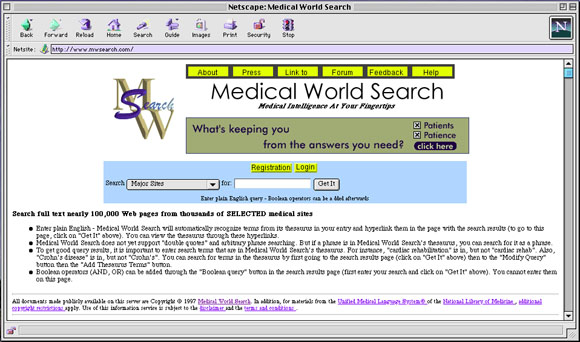
Fam Pract Manag. 1999;6(2):56
For searches of the clinical and allied health literature, nothing beats MEDLINE online (http://www.nlm.nih.gov/databases/databases_medline.html). But for searches of the World Wide Web at large for information related to medicine and health care, I recommend Medical World Search (http://www.mwsearch.com).

Medical World Search uses a combination of automated web-site retrieval and manual selection of sites to retrieve only web pages offering clinical information. It also employs the Unified Medical Language System, a medical thesaurus developed by the National Library of Medicine, which maps about 500,000 medical terms and definitions. Both features make Medical World Search more efficient than other web search engines and less likely to produce matches containing advertising or commercial content. In addition, Medical World Search is very easy to use, it supports advanced search techniques (such as the use of Boolean operators), and its documentation is excellent.
By the way, here's a web-searching tip that applies to any web crawler or search engine, such as AltaVista (http://www.altavista.com), Excite (http://www.excite.com) or HotBot (http://www.hotbot.com): Add more words to narrow your list of matches. Focus on the key terms and phrases that identify your concept, and then enter them as a list. For example, if you're searching for web pages about asthma in pediatric patients, you might try a search string including the words children, asthma, treatment, medical and pediatricians. Good searching!